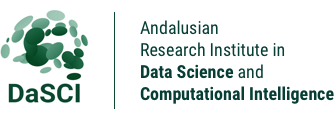AI will have a transforming role in our societies
31 January, 2022
We start the DaSCI Newsletter interviews with the participation of José Luis Flórez, Director of Artificial Intelligence at Minsait (Indra) and President of Dive Computer Vision.
José Luis holds a PhD in economics and is a mathematician. His professional career has always been linked to the application of algorithms and machine learning methods to help organisations in making decisions based on data analysis. His field of research has been focused on the simulation of propagations, both from an epidemiological and sociological perspective, using large graph analysis techniques.
He currently leads the AI strategy of Minsait (Indra), which aims to bring to the market not only AI solutions, but also a new form of consultancy, in which talent collaborates in providing value through an open model of relationships in an ecosystem involving both startups and freelancers.
{Minsait}, an Indra company, is a leading digital transformation and Information Technology consultancy in Spain and Latin America. Minsait has a high degree of specialisation and sector knowledge, which it complements with its high capacity to integrate the core world with the digital world, its leadership in innovation and digital transformation, and its flexibility. As a result, it focuses its offer on high-impact value propositions, based on end-to-end solutions, with a notable segmentation, which enables it to achieve tangible impacts for its clients in each industry under a transformational approach. Its capabilities and leadership are shown in its portfolio of products under the name {Onesait}, and its transversal service offer.
{DaSCI:} José Luis, thank you for participating in this first edition of the DaSCI Newsletter. Let ask you: what specific AI-related technologies do you consider to be the main strengths at Minsait?
{José Luis Flórez:} Minsait’s strategic vision with respect to AI is not based on a technological approach, because we consider technology to be a mere instrument, so we focus more on the aims, which have to do with identifying specific use cases in which we can have an impact: helping to make better decisions, optimising processes or making organisations more sensitive to what is happening in their environment.
In this sense, the great challenge of AI lies in the creation of open collaborative ecosystems that bring together talent, which is scarce in relation to demand and dispersed, with business problems. Once an AI application area and the talent capable of improving a process has been identified, it is the turn of the technology.
In this sense, federated learning on the one hand, and deep learning on the other, the former more linked to cooperation and the latter to increasing perceptive capacity, are two of the areas in which we are investing the greatest effort.
{DaSCI:} Could you briefly comment on a project that Minsait is particularly proud of because of the impact that AI has had on the environment?
{JLF:} We are particularly proud of all the projects in which AI enables an {improvement in people’s quality of life} or environmental sustainability. In the first case, everything related to preventive health management and improved diagnostic capacity; in the second, waste management, identification of environmental risks or increased energy efficiency.
{DaSCI:} In terms of research, Minsait collaborates with the scientific community in general to jointly discover new AI techniques or applications. Which projects could you highlight?
{JLF:} We are participating in innovative projects linked to, among many other activities: diagnosis of pathologies; sustainability, through the optimisation of waste management processes; care of dependent and chronically ill people, through monitoring systems; initiatives for the creation of collaborative platforms between data scientists and companies, through federated and differential privacy models; protecting our democratic health, through measures for the identification of information poisoning.
{DaSCI:} How is Indra’s relationship with DaSCI and which of the existing or planned collaborations are you most excited about?
{JLF:} There is a very close relationship with DaSCI through the University of Granada and eDIH Andalusia. In this sense, we are particularly excited about the development of closer public-private collaborations aimed at innovation with real impact, in which we collaborate with DaSCI, the University of Granada, with several of the biggest technological giants and a good number of startups with differential capabilities and technologies in AI.
{DaSCI:} In your opinion, what is necessary to successfully create and develop a world-class innovation ecosystem in AI?
{JLF:} AI will play a transformative role in our societies, even in our cultures, and that change is at the very beginning of the beginning. We have the capacity and the obligation to lead the creation of products, based on AI, with the ability to compete internationally. To do this we need to {bring together quality talent} in sufficient quantity to have critical mass, which among other things, allows us to attract even more talent, and we need to build on the unrivalled capabilities of the tech giants to be able to build on the state of the art. We need to help make AI an industry in our country.
{DaSCI:} To end this interview, we would like you to do a bit of visionary thinking: will our society be transformed in 5 or 10 years by AI? In what sense?
{JLF:} It is already changing. It changes society because it changes people and the way they communicate and collaborate. It is also unprecedented that machines can execute cognitive tasks, it changes everything.
When I say people change, I mean that a person with a simple mobile phone becomes what we could call an “augmented human being”, with access to any kind of information at any time.
The change will be so profound that it will turn us into something else, both as individuals and as a society.
Communication also changes radically when any person becomes a means of communication in itself.
Finally, machines with cognitive capabilities will change the dynamics of work, health and leisure.





